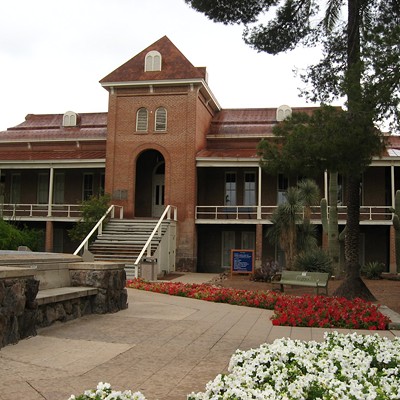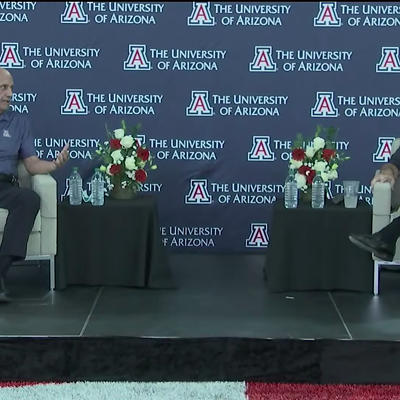As a new poll showed a tight contest between Republican Congressman Jeff Flake and Democrat Richard Carmona in the race for a U.S. Senate seat, the two candidates battled last week over environmental issues and Medicare funding.
The Public Policy Polling survey of 993 likely voters, taken Sept. 7 to 9, show that 44 percent of voters support Flake, while 43 percent support Carmona, who served as surgeon general in the George W. Bush administration.
The survey, by the Democratic-leaning firm, also shows Republican presidential nominee Mitt Romney with the support of 53 percent of Arizona voters, while 44 percent support President Barack Obama—which suggests that some Arizonans are willing to consider splitting the ticket to support Romney in the presidential election, but Carmona in the Senate race.
Carmona spokesman Andy Barr said via email that the poll "proves what we've been saying all along. This race is winnable, because Rich Carmona is a unique candidate with broad and bipartisan appeal."
Meanwhile, Flake spokesman Andrew Wilder said a close race was no surprise.
"The Flake campaign has always expected this to be a close race," Wilder said via email. "That's why Jeff is working hard to earn the trust and votes of Arizonans."
In the days after the poll hit, the two camps continued to swing at each another.
Team Flake went after Carmona on the environmental front, challenging the Democrat to support a land swap that would allow mining near Superior.
"Does Carmona agree with Jeff Flake and most Arizonans that this land exchange needs to happen, or does he agree with the Obama administration in blocking the bill?" Wilder asked in a press release after the Arizona Democratic Party criticized Flake for supporting the swap.
While some Democrats have supported a swap in the past (including Ann Kirkpatrick, the one-term Democratic congresswoman who is hoping to make a comeback in the new Congressional District 1, where she faces Republican Jonathan Paton), the bill allowing the swap passed the U.S. House of Representatives last year, but didn't get through the Senate.
Carmona told the Weekly via email that he had visited Superior to tour the mine site and talk with local residents.
"They agree that while the land exchange has enjoyed the support of Democrats and Republicans, for years, both sides have used it in a game of political football," Carmona said. "Governing requires cooperation and compromise. I understand the need to protect our natural resources while making critical investments to create jobs. So I refuse to believe we can't find a workable solution to balance the environmental and economic concerns and allow this project to move forward."
Carmona took an additional shot at Flake, calling it "shameful that the future of economically depressed mining towns in rural Arizona, like Superior, remain hinged on the whims of chronic politicians like Jeff Flake, who, after 12 years in Congress, try to distance themselves from congressional inaction created by partisan gridlock they've perpetuated in Washington."
On another front, Team Carmona fired back at Team Flake over the GOP campaign's charge that Carmona supported more than $700 billion in cuts to Medicare over the next decade.
Team Carmona argued that Flake's charge—which GOP politicians and their allies in the independent-campaign universe have been making for the last two years—had been ruled mostly false by PolitiFact and misleading by The Washington Post and FactCheck.org. The Carmona campaign also pointed out that Flake had supported more than $700 billion in future spending reductions when he voted to support a GOP budget plan developed by Congressman Paul Ryan.
Wilder stood by the claim that the Affordable Care Act had cut Medicare spending by more than $700 billion over the next decade in an emailed response to Team Carmona's statement.
"The Carmona campaign can try to spin things all day long, but they don't dispute that Democrat Carmona supports President Obama's health-care law, which cut $716 billion from Medicare to pay for it," Wilder said. "So it's a little rich for the Carmona campaign to 'Mediscare' Arizona's seniors when their candidate supports a law that actually cut hundreds of billions from Medicare."
Team Flake continued to push the issue this week with the release of a letter signed by more than 40 Arizona physicians who urged Carmona to call for the repeal of the Affordable Care Act.
The doctors—led by Phoenix physician Jeffrey Singer, who has supported propositions in the past to prevent the government from requiring Arizonans to buy health insurance—said that the Affordable Care Act would exacerbate a doctor shortage, and that Medicare cuts to hospitals, doctors and other providers would hurt the elderly.
"Instead of reforming Medicare to control costs, these types of cost controls will only make it cost-prohibitive for physicians to accept new Medicare patients," the doctors wrote.
Barr said that Carmona believed in reforming the Affordable Care Act rather than repealing it in its entirety.
"Dr. Carmona frequently says both parties got it wrong on health care, and Congressman Flake knows that," Barr said via email. "Congressman Flake also knows that he voted for that same 'cut' to Medicare he is now falsely accusing Dr. Carmona of supporting. If Congressman Flake—a 12-year incumbent and former lobbyist—could run on his record, he would. But instead, Congressman Flake has run an entirely negative and misleading campaign in hopes of distracting voters from his record of slashing benefits for seniors and veterans, and trying to block women's access to contraception."

















